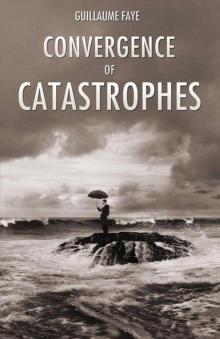Convergence of Catastrophes, page 17




* * *
‘Neo-primitivism’ is an observable process of cultural involution today that consists of a return to the behaviour of primitive masses, a decline of cultural memory and the appearance of social savagery.
There are countless signs of this new primitivism: the rise of illiteracy in schools, the explosion of drug use, the Afro-Americanisation of popular music, the collapse of social codes, the retreat of general culture, mastery of knowledge and historical memory among young people, the dilution of contemporary art into the nihilist brutality of less-than-nothing, brutalising the masses and stripping them of culture by audiovisual media (the ‘cathode religion’),[185] the increase in criminal activity and barbarous behaviour (social savagery), the disappearance of a civic sense, the accelerated crumbling of homogeneous social norms and collective disciplines, the impoverishment of language, the reduction of social codes, and so on.
The generation of young Beurs-Blacks offers a remarkable example of this neo-primitivism, but they are not the only ones to be affected by it, far from it.
The paradox of this new primitivism, a real process of ‘decivilisation‘, is its association with a dominant devirilised ideology that extols civility, the rule of law, altruism, humanitarianism, citizenship, ‘culture’. It is, however, a question of a banal phenomenon of compensation. This neo-primitivism is perfectly consistent with a tightening of social controls, domestication by consumerism, and a collective loss of intellect and of all critical thinking. It is manifested as the pendant of neo-totalitarianism. It serves the short-term goals of the strategies of domination of the political class, the intellectual-media class and, especially, the transnational financial and economic complex. In a dialectical style of reasoning, this neo-primitivism could well turn against the contemporary civilisation that gave birth to it, to the degree that the present young generation of new barbarians will no longer be capable, very simply, of making this civilisation function technically.
This generation will offer only slight resistance to the work of purging and brainwashing carried out by active minorities, whoever they may be. What can a mass of slaves, the ‘last men’ Nietzsche described,[186] do in the face of real and resolute aristocracies?
* * *
More than ever, society is ‘stalled’ and suffers from sclerosis, because of the great benefits reaped by stonewalling public bureaucrats who are hostile to any reform and the impotence of governments in the face of union minorities, pressure groups and street mobs. All this indicates the appearance of a new class struggle. It is the voters on the Left who find themselves objectively on the side of the exploiters. Here is what we are facing:
1) Those with ‘guaranteed salaries’ (all those public and quasi-public bureaucrats who enjoy a job for life, with complete social coverage and countless privileges); immigrants who, more than native-born citizens, have become overprotected welfare recipients practicing parasitism with impunity; the traditional and relatively small class of the wealthy grand bourgeoisie (allied with the sphere of intellectuals and the media), now joined by a new class of speculators.
2) The middle class, which is less and less protected by guaranteed lifetime employment, is in full decline because of limited-term contracts (CDD), social plans, downsizing, etc., and placed in a precarious position, although the totality of economic growth and the creation of wealth rests upon them.
3) A growing native-born proletariat, unemployed and underemployed, lives in a state of poverty and insecurity. We should note that the famous ‘exclusion’ affects principally native-born Europeans, since colonising immigrants benefit from the privileges of public aid and communitarian solidarity.
The result is that the protected class lives at the expense of working, unprotected classes that they exploit. The members of the legislature and the executive branch who make the rules belong obviously to the protected class.
As a result, we are witnessing the very serious phenomenon of the flight of the elites, the prelude to a process of descent into Third World status. Fleeing this stalled and overtaxed society, where the state burdens creative forces rather than helps them, millions of young brains move abroad every year. Who is replacing them? Unskilled and unproductive immigrants, who are extremely expensive, since they are for the most part takers and not givers.
Democracy, already diminished by the oligarchic careerism of professional politicians, sees itself disfigured by a judicial republic and an aggravated censorship of the ‘politically incorrect’, where ‘thought crimes’ are viewed as antithetical to the rule of law. Abstention from voting has reached unheard-of proportions. Governments are based on minorities, that of the class of intellectuals and media. When you realise the Greens and Communists, who represent only a small part of public opinion, succeed in imposing the laws they favour, you understand everything.
In reality, everything is happening as if this Western ‘democracy’ is slowly aligning itself with the Stalinist model, itself inspired by the despotism of the masters of the French Revolution. The ruling class of intellectuals and the media, openly hostile to populism and demagogy, opposes all direct democracy, and, especially on the Left, has sunk to cultivating contempt, suspicion and phobia of the people. Western pseudo-democracy is really an oligarchic, neo-totalitarian system.
A process of soft totalitarianism has been put in place, legitimised of course by ‘democracy’. The circle of political parties in power in Europe (bogus majorities and bogus oppositions) really resembles a single party that subscribes as a whole, with nuances, to the same ideology. Direct democracy, like Switzerland’s, is perceived as illegitimate, and popular opinion as immature and dangerous. One party, the Austrian Freedom Party,[187] is officially considered illegitimate, even though its candidates are duly elected.
Paradoxically, the institutional weakness toward morals, crime and immigration is accompanied by a strengthened political repression, of surveillance and heavy taxation of native-born citizens. Big Brother has become Ubu Roi[188] and vice versa. The dissolution of the vital forces of society, the muscles, in favour of an ossification and strengthening of the skeleton is taking place.
In our economy, we have piled up the disadvantages of capitalism and socialism without receiving any of the advantages of either system. From capitalism, we receive only the free market system and the irresponsible open border policy without being helped by the advantages of the freedom to create business; from socialism, we receive only centralisation, union corporatism, high taxes and bureaucracy, with no advantages stemming from social justice, real social solidarity and the right to a job.
Theoreticians of the Left and Right, who lack economic knowledge and business experience, are wrong to affirm that ‘liberalism is the chief enemy’ and that we living in a society of savage ultra-liberalism. This recycling of Leftist analyses misunderstands the reality.
First of all, it is quite right to combat an unbridled global free-market system, but not the play of the market in a protected European continental interior space. Demonising the ‘market’ comes to the same thing as playing the game of a sclerotic and Communist-like corporatism. Finally, criticism of the ‘market society’ and the ‘almighty dollar’ should not cause us to forget that the principal motor of performance, economic energy and innovation is competition. The initial cause of the dynamism of competition has been and always will be, deplore it or not, maximising gains (and not virtue).
Criticising the ‘market society’ does not mean criticising the market and its liberal principle, but opposing an eventual dictatorship of the market and the forces of speculation. It also means demanding, above the market, the presence of a sovereign function and political leadership, and, below the market, corrective mechanisms of social solidarity for citizens who cannot subsist by their work.
What causes problems for our society is not too much liberalism, but too much socialism; and the worst sort of socialism, not the socialism of Proudhon[189] and Blanqui,[190] but one inspired by Communism, bureaucratic corporatism, acquired privileges and colossal mandatory taxes. This is very far from the idea of social justice, proclaimed all the louder as it has never been applied.
Slowly the great institutions of the public sphere, the very foundations of all civilisation, are crumbling: school, hospital, army, police, and with them the founding principles of a living society — security and public health, the transmission of knowledge, and so on.
Still society remains on its feet, like a scarecrow in a field ravaged by crows. It is the ‘new society’ of the ‘new modernity’, which keeps growing larger (on the Internet, of course) while it is rotting away inside like a colossal dead tree that is held up by its bark and will fall with a loud crash when the hurricane arrives.
As society exhausts its inner sap, its moral values and biological energy, the dried-up mechanism of the state responds by becoming even stronger. Administrations grow harder and swell, but there is no heart, the blood no longer flows, enthusiasm and liberty die out. A bogus civilisation is built up while a true culture collapses.
* * *
What are the real statistics of semi-literacy and illiteracy in France? They are mind-blowing and mark the failure of the lax and ‘educationalist’ methods of public education, which have been dogmatically imposed since 1968. Semi-literacy is a very poor mastery of the written language; illiteracy betokens total ignorance. 25 per cent of college graduates are currently ‘semi-literate’ in the definition given in 1901 by Louis de Sours, ‘eccentric orthography, non-existent syntax, slow reading’, in Les progrès de l’éducation républicaine.[191] It is a reasonable guess that the proportion of young semi-literates is today higher among teenagers and young adults than in 1910. When one takes account of mass immigration, 20 per cent of the adult population is estimated to be illiterate (not knowing how to read or write). This brings us back to the statistics of about 1830. It has been established that the ‘capacity to write’ and ‘to read a simple text’ by today’s student (high school graduation) is inferior to the competence of a Third Form student (holding a ‘diploma’) at the beginning of the Twentieth century. Testing done by the Ministry of Defence on draftees and enrolled soldiers from 1970 to 1999 shows mastery of written French shrank by 35 per cent during this period. One could respond cynically that in the age of multimedia and audiovisual hype it is no longer necessary for people to know how to read and write . . .
* * *
The rule of law is dying. The state is proving to be increasingly incapable of making people respect the law and its ‘monopoly of public power’, the symbol of the jus publicum europeanum[192] since the Fourteenth century. Many examples confirm this hypothesis in very different areas: private security companies are replacing the police; 85 per cent of crimes are not prosecuted (Europol statistics, June 2001) because of a lack of means or will; illegal immigrants are not deported, even when they commit other crimes, despite the law; illegal ‘rave parties’ and the traffic in drugs that they entail are tolerated; the atrocities of the partisans of the Trotskyite José Bové[193] (the pseudo-anti-globalist) remain totally unpunished; obviously there is no need to speak of Corsica, where hoodlums, who call themselves ‘autonomists’, parade armed as if for war under the eyes of the mocked and impotent police. The only people punished are reckless drivers who drive faster than the speed limit authorised by the law. It all fits perfectly.
This decline in law and order is accompanied, quite logically, by legislative inflation. Over the past twenty years, 7,500 laws have been passed and the immense majority remain a dead letter. The Journal officiel[194] is 17,000 pages long. Too many laws kill the law. Power no longer has the means to make people respect an excess of often surreal texts. Add to this the legislation of the EC, also worthy of Ubu Roi. The collapse of the rule of law in Europe corresponds precisely to the rise to power of a judicial ideology best described as the ‘dictatorship of judges’.
In the tradition of ancient Greece (reread Solon[195] and Plato), the law was supposed to be ‘brief, imperative and solemn’, and above all it was not to tolerate any transgression.
Nature has a horror of the void. What happened at the end of the Roman Empire could very well happen again. The law of a failing state run by incompetents — who are, however, filled with the certainty of their competence — is replaced by another law, that is, a new type of relation through force. Our leaders should reread the history of Rome at the end of the Third century . . .
The European Union: The Shattered Dream
The expansion of Europe is a fool’s bargain. Here are extracts from an interview in Le Figaro (7 October 2003) with Christian Saint-Étienne, author of La puissance ou la mort: L’Europe face à l’empire américain:[196] ‘Over the next twenty years, the strategic problem is not knowing whether the United States is going to collapse or not, but if Europe is going to disappear or not.’ Predicting that when a federal Europe will be 30 or 40 years old, it will probably be totally powerless, Saint-Étienne reaffirms that the nationalist principle and not ‘world government’ will rule the Twenty-first century — under the giant states of the USA, India, China, and others — and that the idolatry of ‘international law’, which belongs to the past (Twentieth century), is only a pretext hypocritically defended by the weak — like contemporary France. Similarly, the American Robert Kagan[197] notes, against the dogmas, ‘The globalisation of civil societies and governments is not credible over the next generation.’
Saint-Étienne continues, ‘In the short term, the arrival of the Ten,[198] and especially Poland, to play the role of the fifty-first American state in Europe — or the fifty-second if Great Britain is reckoned as already the fifty-first — is naturally going to confuse European strategic choices. . . Europe would do better to concentrate its efforts on civil and military technology, not the entry of new members. . . Europe should fight against three major scourges, colossal demographic decline, extreme weakness in research and development and lack of productive investment.’ The last two factors are largely due to the brain drain and the gigantic socio-economic cost of uncontrolled immigration.
* * *
European institutions are working against Europe. The authority of the unelected European Commission is once more about to overstep its role and in a very important area: the diversity of Europe’s national languages.
In 1994, France decided to proscribe the use of English (and any other foreign language) in publicity campaigns and advertising products. The Eurocrats agreed with the decision, but now they have changed their mind. In a justified ruling, the European Commission insisted that France no longer impose the use of French on food labels; a picture of the product would suffice. The result was foreseeable. For obvious economic reasons, the farming and food firms (waiting for the rest) are going to label their products in English, the best-known European language.
This anecdote summarises by itself the following situation: European institutions, and especially the European Commission, are not defending Europe, but are destroying it to the advantage of the Americans and the masses of immigrant-colonisers. Here are some points that underline this perverse trend:
1) By its directives, the European Commission arrogates to itself the powers of the Council of Ministers, completely illegally. Manipulated by ‘committees of experts’, it systematically corrodes and undermines state sovereignties without replacing them with a federal political sovereignty and without being checked by the rump Parliament in Strasbourg. The ‘Convention’ with Giscard d’Estaing[199] as its President will probably make things worse. The European Commission represents a technocratic despotism in a chemically pure state that exists nowhere else in the world.
2) European institutions flout the principle of subsidiarity[200] and decentralisation and practice, on the contrary, a fussy and aggravated Jacobin centralism. What business does Brussels have with the labelling of products in France or Italy, the procedures for making cheese in Normandy, or the maturing of oysters in Charental? Have the ‘regionalists’ who support the current European Union not understood that the EU is in fact totally opposed to all regional autonomy? In the USA, the states have great latitude in legislating in relevant areas — more so than European states! Recently, several German Länder (regions) have noticed that the EU is eliminating the powers accorded them by the German federal state.
3) In all matters, the European Commission and the Parliament in Strasbourg are following a political and ideological line totally contrary to the interests of Europe: dogmatic global free trade, a low profile in the face of American commercial injunctions, encouraging the use of English, open borders immigrationism and militant Islamophilia and Holy Roller humanitarianism, matched by a total lack of political or geopolitical vision for Europe, which is replaced by the religious vulgate of human rights.
4) The expansion of the EU without any preparation into central Europe (indeed, into Turkey as well) will make whatever results unmanageable. And it will cost a lot of money. The countries that have applied for entry are first of all looking for subventions. It is absurd to make countries participate in the same economic and monetary unit when the ratio of their standard of living is sometimes 1 to 5. On 1 January 2004, the EU will grow from 15 to 25 members. No one agrees on the size of the subventions to offer them. A two-tier Europe will be established, and we shall see the unemployed of ten new countries pour into the West. The ‘Convention’ with Giscard d’Estaing for its President has not made and will not make any proposal to revise the EU’s institutions to accommodate these new countries.



















